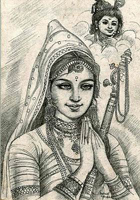Mira is Steadfast Comments
I will not be restrained now, O Rana,
Despite all you do to block my path.
...
Read full text
Oh this 'Poem of the Day' has made my day! So wonderful to read and think over! 'I have torn off the veil of worldly shame; Only the company of Saints is dear to me' - 'the veil of worldly shame is a great metaphor. 'Mira, unadorned and unbedecked, Roams intoxicated in the Lord's love' - The concluding two lines couldn't be better! This poem gets 10/10 from me.
My master has revealed to me The mirror within my own body; Now I'll sing and dance in ecstasy., , such a grat mystical Poem a great 100
She has a jewelry box of jewels to choose her words from! Gorgeous. Rich. Luminous. And so freeing!
This is truly a wonderful poem, O Rana. What an inspiration!
Mirabai shines brightly as a devotional poetess who through her intense 'Bhakti' for Lord Krishna, proved to the world that there is no sweeter emotion than pure love for God. Mira, unadorned and unbedecked, Roams intoxicated in the Lord's love. Wonderful poem!
Very nicely done. The flow and its rhythm is perfect. Loved it.
Overall I like the sound and feel of this translation—Mirabai’s spiritual intensity crackles from it. I wish, though, that a translation of surat and nirat had been explained in footnotes. Mira’s radical and uncompromising devotion is an example for us. -Glen
My true Lord I have come to behold; None knows of this wealth within the body............so touching and true. Beautiful poem. English version by V. K. Sethi shared nicely.
For the love of GOD I'm here in this fort of forest! infested with wilderness around me! None I'm, not a monk, not a saint not a harlot, not a escaping taint! I'm into me the LOVE the scar of LOVE Love for HIM I left everything //// excellent I fancy not your forts and palaces Nor want silken robes wrought with gold.
A poem that has seen light within shrouded by a apparition created by the mind.

'My surat and nirat, awakened, Now shine bright' - Like @Glen Kappy, I too wished there was an explanation of the words 'Surat' and 'Nirat' at the end of the poem.